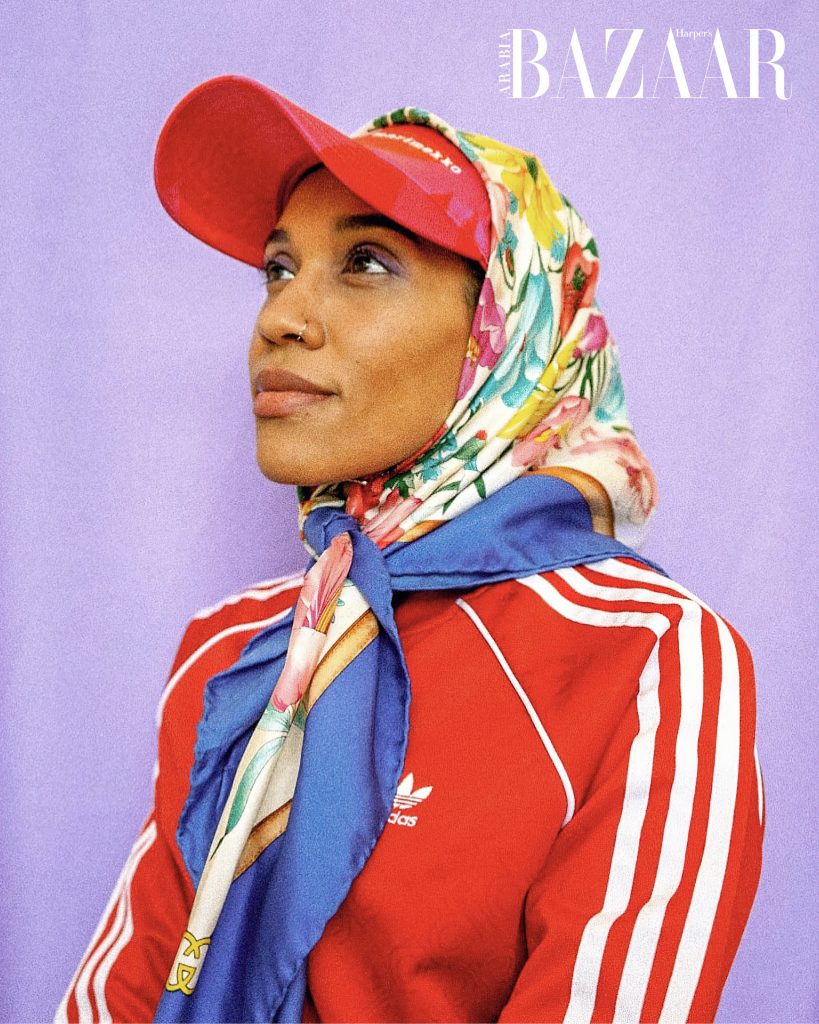The hijab is a part of a woman’s faith and identity. At the end of the day, it’s about choice”
Risk it for the biscuit. I first came across the term when researching British-Sudanese basketball player and activist Asma Elbadawi, an athlete who doesn’t shy away from adversity when championing change and inclusivity within her sport. While all players possess the ability to take calculated risks, both on and off the court, what’s truly remarkable about Asma is that she seems to thrive when it comes to pushing the boundaries, shining brightest when challenging exclusion and sticking up for what’s right.
In 2017 Asma was at the forefront of social change, where she and other women convinced 130,000 individuals to sign an online petition to overturn FIBA’s (International Basketball Federation) ban on religious headgear in professional basketball – a feat that made the sport not only accessible to hijabi women, but anyone who chooses to cover their head due to their faith . “At the time, it felt a bit surreal. Because it was a bunch of girls that got together and decided to take on a huge governing body,” she says, looking back at the David and Goliath-esque moment which overturned the ban in 2018. “And when they listened to us, it just felt like such a relief, but also for me, personally, it felt like if I can do something like that, then I can do anything that I want.”
Fast forward four years later. While she’s still championing inclusivity in sport and being a role model for young basketball players, Asma is also a published author, multifaceted creative (she studied Photography, Video and Digital Imaging at the University of Sunderland) and the face of adidas’ Impossible is Nothing campaign – which was recently shot in Dubai on a glow-in-the-dark rooftop basketball court on the Palm Tower.
“It aligns with a lot of my values in terms of feeling like nothing is off limits, and that I can continue to push my own boundaries in any way that I can,” she says, touching on how it also extends to her artistic endeavours – something which she has put on the front burner in recent years.
A spoken word poet and playwright – who happens to have dyslexia – she shares the somewhat unusual way she fell in love with prose. “I always used to have red markings in my school books, because of my spelling,” she says, referring to her teachers constant corrections when she was growing up in Bradford, West Yorkshire. “When we learned about poetry, I was just so fascinated by its potential. I love daydreaming and I have such a wild imagination. With poetry, you can almost take other people on that adventure with you.”
For many years she kept her writing private, eventually including it within her photography work throughout her degree, a side dish of poems to go along with the visual feast.
“Eventually, I felt like I wanted to see what that was like by itself,” she says, touching on how she made the jump into performing her word. “I’d seen a lot of poetry camps when I was growing up and I felt like there was a lot of power in standing on a stage, in front of people and sharing your words without any distractions.”
Despite her success, the game of fighting for inclusivity within the sporting world – and beyond – is far from being finished business. As lawmakers in countries like France and India continue to propose banning the hijab and other religious headgear in public spaces, Asma admits she can’t help but feel concerned and frustrated. “It’s just such an annoying thing to have to deal with it every few years, regurgitating the idea that the hijab doesn’t affect the players’ safety. The hijab is a part of a woman’s faith and identity. At the end of the day, it’s about choice,” she says, touching on how the “our way or the highway” mentality of some legislatures is a step back.
Nevertheless, she still has some solid advice for female hijabi players looking to go pro: while foregoing the status quo may seem intimating, taking a risk and venturing beyond your comfort zone is the key to success.
“Go out into your community, into your city and find out which coaches are out there, that are coaching the sport that you really love – and then find out how to get into those spaces where scouts are actually going and selecting players, so you can move forward,” she advises. “Don’t worry about being the first person [like yourself] in a space. Often, if you’re a person of colour, you might play a sport that not a lot of people from your community play. Go and stay, and eventually, someone [else] will arrive there and they’ll see you.” She pauses, and then says, with conviction “And then they’ll feel like they belong also – and then, eventually, there’ll be more than just you. You’re the starting point of a bigger movement.”
With great risk often comes great reward; and nobody understands it better than Asma herself.
source/content: harpersbazaararabia.com
___________

___________________________________
UNITED KINGDOM (U.K) / SUDAN